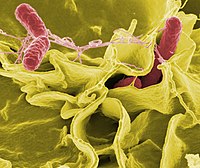
Photo from wikipedia
The objective of this study was to develop a qPCR method for specific enumeration of viable Listeria monocytogenes in food processing facilities and heat treated products. Primers specific for L.… Click to show full abstract
The objective of this study was to develop a qPCR method for specific enumeration of viable Listeria monocytogenes in food processing facilities and heat treated products. Primers specific for L. monocytogenes were designed to amplify a short (199 bp) or long (1561 bp) fragment of the listeriolysin (hly) gene. The short- and long-amplicon qPCR methods with and without propidium monoazide (PMA) treatment of the cells were tested for their ability to discriminate between viable (no heat) and heat-killed cells (90 °C, 10 min). The PMA-qPCR methods were subsequently used to assess the survival of L. monocytogenes during desiccation (33% RH, 15 °C) on stainless steel surfaces for ten days with and without prior biofilm formation. The long-amplicon qPCR method had a limit of quantification (LOQ) of 1.32 log CFU/reaction (efficiency 92%, R2 = 0.991), while the LOQ for the short-amplicon qPCR method was 1.44 log CFU/reaction (efficiency 102%, R2 = 0.991). PMA was essential for detection of viable cells, and the long-amplicon PMA-qPCR significantly (p < 0.05) reduced the signal from heat-killed cells compared to the short-amplicon method. L. monocytogenes survival during desiccation without biofilm formation was accurately enumerated with the long-amplicon PMA-qPCR method. However, when L. monocytogenes had formed biofilm prior to desiccation, the long-amplicon PMA-qPCR accurately measured the log fold inactivation but underestimated the number of viable cells even with use of an optimized DNA extraction method. This long-amplicon PMA-qPCR method can aid in the detection and enumeration of viable L. monocytogenes cells to further the understanding of its survival and persistence in food processing facilities. The developed method was demonstrated to work on both heat and desiccation treated cells and highlights the importance of amplicon size in viability-qPCR.
Journal Title: Food microbiology
Year Published: 2020
Link to full text (if available)
Share on Social Media: Sign Up to like & get
recommendations!